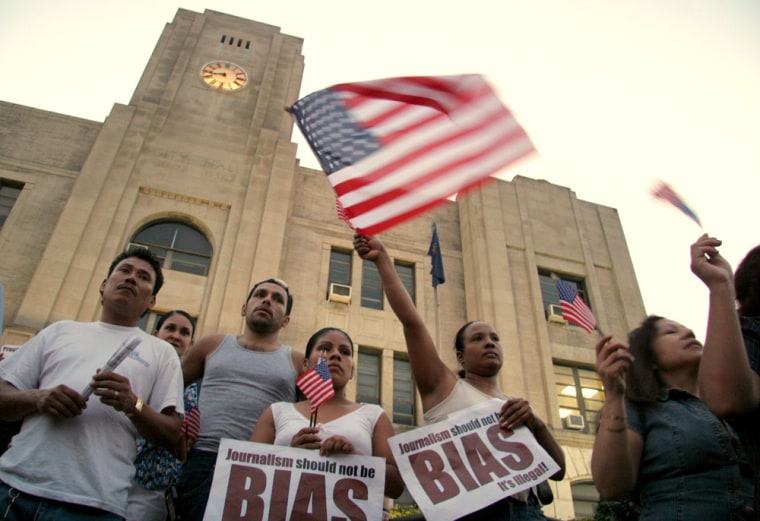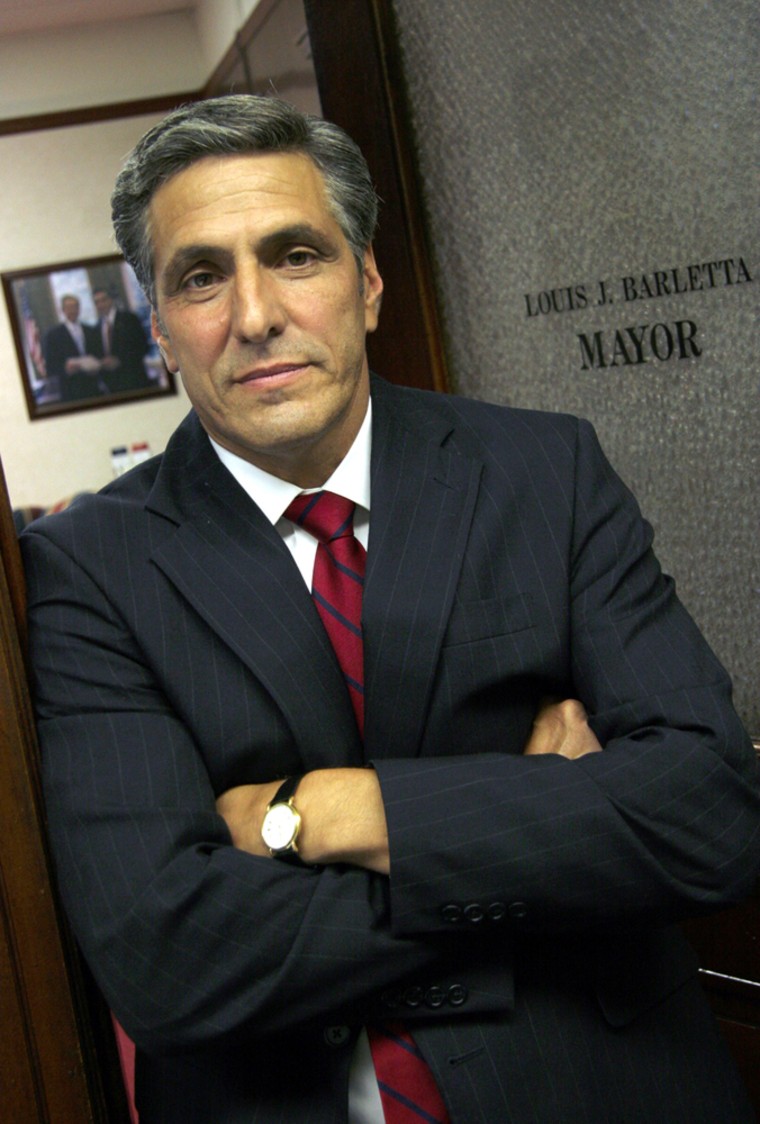An immigrant's grandson, Louis J. Barletta, the mayor of this once-sleepy hill city, leans forward behind the desk in his corner office and with an easy smile confides his goal.
Barletta wants to make Hazleton "the toughest place on illegal immigrants in America."
"What I'm doing here is protecting the legal taxpayer of any race," said the dapper 50-year-old mayor, sweeping his hands toward the working-class city outside. "And I will get rid of the illegal people. It's this simple: They must leave."
Last month, in a raucous meeting, the mayor and City Council passed the Illegal Immigration Relief Act. (Barletta wore a bulletproof vest because, he says, Hazleton is menaced by a surge in crime committed by illegal immigrants.) The act imposes a $1,000-per-day fine on any landlord who rents to an illegal immigrant, and it revokes for five years the business license of any employer who hires one.
The act also declares English to be the city's official language. Employees are forbidden to translate documents into another language without official authorization.
The law doesn't take effect for another month. But the Republican mayor already sees progress. "I see illegal immigrants picking up and leaving -- some Mexican restaurants say business is off 75 percent," Barletta says. "The message is out there."
So another fire is set in the nation's immigration wars, which as often burn most fiercely not in the urban megalopolises but in small cities and towns, where for the first time in generations immigrants have made their presence felt. In these corners, the mayors, councils and cops cobble together ambitious plans -- some of which are legally dubious -- to turn back illegal immigration.
'Fear of change'
Last year two New Hampshire police chiefs began arresting illegal immigrants for trespassing, a tactic the courts tossed out. On New York's Long Island, the Suffolk County Legislature is expected to adopt a proposal next month prohibiting contractors from hiring illegal immigrants.
Hazleton has upped that ante, and four neighboring municipalities in Pennsylvania and Riverside, N.J., already have passed identical ordinances. Seven more cities, from Allentown, Pa., to Palm Beach, Fla., are debating similar legislation.
"The ideas that these things are happening spontaneously would be mistaken," said Devin Burghart, who tracks the immigration wars for the nonprofit Center for New Community in Chicago. "What is driving folks is fear of change and changing demographics."

German, Italian and Japanese television crews have interviewed Barletta. He has received 9,000 favorable e-mails and has raised thousands of dollars for the city's legal defense on a Web site called Small Town Defenders. (Two staffers from Sen. Rick Santorum's staff prepared the site; Santorum, a Republican who is in a tight reelection race, has pushed for immigration crackdowns.)
But Barletta and the council just might walk off a legal cliff. The American Civil Liberties Union and the Puerto Rican Legal Defense and Education Fund have sued to block the ordinance, saying it could ensnare many who are here legally.
Even the Federation for American Immigration Reform, which organizes cities and towns to push for tighter immigration quotas and much tougher enforcement, says Hazleton's ordinance is overly broad.
"If you are going to use the word 'illegal immigrant,' you have to be very careful when you are defining that term that it corresponds to federal immigration classification," said Michael Hethmon, a lawyer with FAIR. "You can't use terminology that mixes and matches illegal immigrants and legal immigrants."
Working for a revival
High in coal country, Hazleton sits perched on a rocky mountain ridge, and more than once immigration has been the agent of the city's deliverance.
Hazleton (it was supposed to be "Hazelton," but a clerk misspelled the name at incorporation) was founded in the early 1800s atop a thick vein of anthracite coal -- "black diamonds" -- and immigrants arrived by the thousands to mine it. The Irish came first, then Italians and Tiroleans, Poles and Slavs. There were mine disasters, and for decades bosses and workers fought pitched wars. Always there were complaints that the most recent arrivals didn't speak English or understand American customs.
Hazleton's city fathers, though, tended to be progressive. In 1891, the city became the third in the nation to electrify. And they helped silk and garment mills open. Not all of this was wholesome -- worthies from Murder Inc., not least mafia boss Albert Anastasia, owned a few mills. Sometimes politics was settled with fists or a carefully aimed pistol.
In the 1930s the coal mines closed, and then the mills moved south. Barletta was elected mayor in 2000, and he's credited with working hard at Hazleton's revival.
But the big change came half a decade back when Latinos -- Puerto Ricans, who are citizens of the United States, and Dominicans -- began driving west on Interstate 80, fleeing the high housing prices and cacophony of inner-city New York, Philadelphia and Providence. They found in Hazleton a city with an industrial base and cheap housing (an old Victorian could be had for $40,000 five years ago).
Latino-owned markets, restaurants and clothing stores sprang up along Wyoming Street, and property values tripled. Hazleton's population has jumped from 23,000 to 31,000 in the past six years.
Daniel Diaz stands behind the cash register in his supermarket filled with plantains and tamales and Goya products. The gray-haired grocer was born in the Dominican Republic but spent 31 years in New York City. He moved here in 2000. He loved the mountain air and bought properties and invited friends to move here, too.
"Five years ago?" He's incredulous you might think it was better then. "It was d-e-a-d. It's gotten better and better.
"Now? Business is down. I don't get it -- they don't like this revival?"
'War on the illegals'
Barletta says it's not that simple. He says his epiphany came in May, when several illegal immigrants walked up to a local man at 11 o'clock one night and shot him in the forehead. One suspect had four false identity papers. "It took us nine hours of overtime just to run down who he was," Barletta said.
This, he said, came on the heels of crack dealing on playgrounds and pit bulls lunging at cops.
"I lay in bed and thought: I've lost my city," he recalls. "I love the new legal immigrants; they want their kids to be safe just like I do. I had to declare war on the illegals."
In truth, the crime wave is hard to measure. Crime is up 10 percent, but the population has risen just as fast. Violent crime has jumped more sharply, but on a small statistical base. Barletta insists there's no whiff of racial antagonism. "This isn't racial, because 'illegal' and 'legal' don't have a race," he says.
It's not hard, however, to discern a note of racial grievance. Many whites who attended the council vote serenaded Latino opponents with chants of "Hit the road, Jack!" A prominent Hispanic leader said Hazleton had become a "Nazi city."
But it's a complicated tapestry. To walk Sixth Street, near the ridge line, is to hear white old-timers warn about the gang graffiti and drug dealing on playgrounds, and then listen as Latino homeowners echo those complaints. A Puerto Rican metal worker and a ponytailed white truck driver swap stories about Mexican laborers driving down construction wages.
Connie and David Fallotovich sit on their porch on a cool summer evening. They sort of miss their sleepy old white city, and they favor a crackdown -- why should an illegal immigrant get a break? They also see their new Dominican neighbors as a big improvement.
David, a custodian, jerks his head at the house next door. "The couple now is really nice. Tell you the truth, buddy, a white family lived there for 20 years and they were a . . . nightmare."
